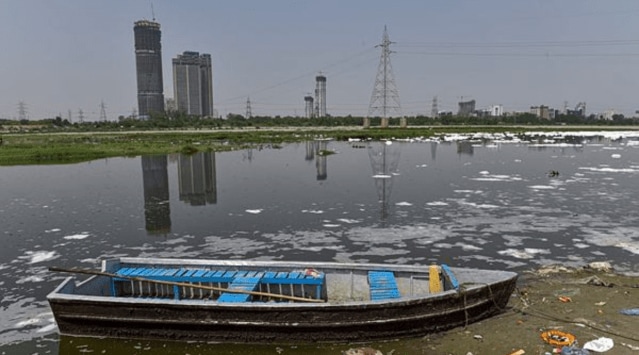Stay updated with the latest - Click here to follow us on Instagram
Delhi bans soaps, detergents violating BIS standards to curb pollution in Yamuna
The NGT had also directed to launch awareness campaigns about the harmful effect of using substandard soaps and detergents.
 A boat is anchored on a bank as toxic foam float in the polluted Yamuna river, in New Delhi, Saturday, June 5, 2021. (PTI Photo)
A boat is anchored on a bank as toxic foam float in the polluted Yamuna river, in New Delhi, Saturday, June 5, 2021. (PTI Photo)
Sale of soaps and detergents not conforming to the quality criteria of Bureau of Indian Standards (BIS) have been banned in Delhi by the Delhi Pollution Control Committee (DPCC).
In a notice on Monday, the DPCC member secretary said the ban was imposed in compliance with orders of the National Green Tribunal (NGT) to prevent pollution of river Yamuna.
“Indiscriminate use of soaps and detergents, not conforming to BIS standards, has been identified as one of the contributors to the deteriorating water quality of Yamuna. There is probability of use of non-permissible chemical substances in the manufacture of soaps and detergents which are not conforming to BIS standards, which may cause harm to the aquatic life, river water quality, animals dependent on river as well as humans,” the DPCC order read.
The Yamuna Monitoring Committee, formed by the Tribunal, had in January recommended banning sale of soaps and detergents that are using non-permissible chemicals. The NGT had accepted the Committee’s recommendations in January and directed the Delhi chief secretary to enforce the ban.
The DPCC notice was sent on Monday to municipal commissioners, Delhi Police commissioner, various heads of departments of the Delhi government, the Delhi Jal Board, and the Delhi Development Authority.
“Sale, storage, transportation and marketing of soaps and detergents not conforming to the revised BIS standards shall be completely prohibited in Delhi,” the DPCC directive read.
All departments and authorities including municipal corporations, civil supplies departments and district administrations having control over shops and establishments have been asked to ensure compliance through strict vigilance and surprise checks.
Monthly reports of inspections conducted and action taken has to be submitted by authorised officers to the DPCC, the directive said. Non-compliance with directions will attract penal action under Section 41 of the Water (Prevention and Control of Pollution) Act 1974.








